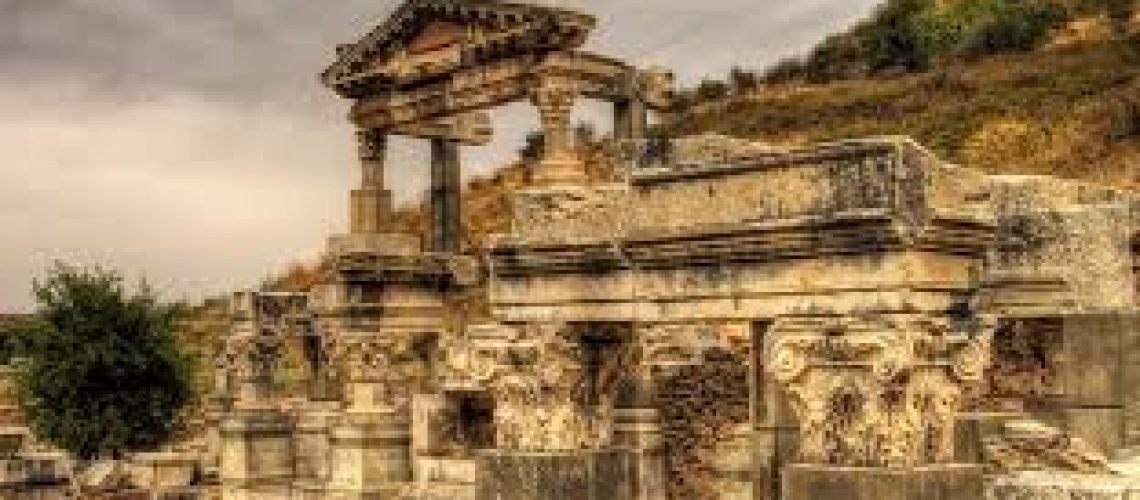
Pastor Mary Anderson
Pastor Anderson is the Pastor of Christ Lutheran Church
In 2006, Jesus scholars, Marcus Borg and John Dominic Crossan, wrote a book together, The Last Week: A Day-by Day Account of Jesus’s Final Week in Jerusalem. I bought it that year and now use it every year for my study and reflection during Holy Week. While the Revised Common Lectionary, which guides our scripture reading throughout the year, makes selections from the Gospel of John for all the days of Holy Week ending in the reading of John’s account of the Passion on Good Friday; in this book these scholars use the Gospel of Mark. The scholarship in these Holy Week reflections is largely theirs. The commentary is mine.
Mark is not only the oldest of the four gospels, but he goes out of his way to chronicle Jesus’s last week on a day-by-day basis. The others are not nearly so precise. Using our day-names in Holy Week, Mark’s gospel looks like this:
Palm Sunday “When they were approaching Jerusalem” Mark 11:1
Holy Monday “On the following day” Mark 11:12
Holy Tuesday “In the morning” Mark 11:20
Holy Wednesday “It was two days before Passover” Mark 14:1
Maundy Thursday “On the first day of Unleavened Bread” Mark 14:12
Good Friday “As soon as it was morning” Mark 15:1
Holy Saturday “The Sabbath” Mark 15:42
Easter Day “Very early on the first day of the week” Mark 16:2
Mark is also the only one who “keeps vigil” on the events of Good Friday following the three-hour intervals like Roman military watch times. It goes like this in Mark 15:
6 AM “As soon as it was morning” v. 1
9 AM “It was nine o’clock in the morning” v. 25
Noon “When it was noon” v. 33
3 PM “At three o’clock” v. 34
6 PM “When evening had come” v. 42
On Palm/Passion Sunday, I spoke about the use of the word “passion”. We have used it to refer to the suffering of Jesus and his crucifixion. He does mean that. The story of Jesus’s suffering, death, and resurrection is the core of the gospel story. But we also know that in our English language we use the word “passion” to refer to something that greatly motivates us, that gives our lives meaning and purpose. What Jesus was passionate about was bringing about the Kingdom of God that would offer justice to all people. It was this first passion for justice that eventually led to his second passion – his suffering and death.
I preached on this Sunday that Jesus had pre-planned his entry into Jerusalem from the east side of the city. He knew, as everybody else did in 1st C Palestine, that at the beginning of Passover week, there would be a military parade coming into Jerusalem from the West as Governor Pilate came to town. This imperial procession entered in with all their military might on display. They were present to make sure the celebration of the Jewish Passover – a celebration of freedom from Egypt, an earlier empire – did not turn into trouble. Jesus put on a parade based on the prophecy of Zechariah 9:9 that a king would be coming to Jerusalem, a humble king riding on a donkey. It is promised that this king will put an end to warfare and bring a different kind of peace. After the palm and hosanna parade is finished, Jesus and his disciples return to Bethany.
Then we come to the Monday of Holy Week or as Mark puts it, “On the following day”.
What happens on this Monday morning involves two perplexing stories that are either difficult to interpret or have been interpreted badly, as in with heavy anti-Semitism. I’m glad this week that we have this opportunity to look at these a little more closely. Borg and Crossan also conclude that just like Palm Sunday was a pre-arranged drama, so is what happened on Monday. Just like the parade reflected the prophecy of Zechariah, Monday is a day to put on display the prophecy of Jeremiah. To prepare for this brief Bible study, I encourage you to pause and read these scriptures this Holy Monday:
Mark 11: 12-19
Jeremiah 7: 1-11
Two perplexing stories, right? — the cursing of the fig tree and the cleansing of the Temple. I will greatly condense the teaching of Borg and Crossan, but I want to get us beyond either our lack of understanding of these stories or beyond the anti-Temple way it has been interpreted. It was only a year ago that I was attending a big interfaith worship service in which one of the Christian preachers used the “cleansing of the Temple” story in a very anti-Jewish way with several rabbis sitting behind her and many Jews in the pews in front of her. The long-held Christian interpretation of this story of “bad Jews”/”good Jesus” is so deep that we don’t even notice it.[i] That’s why I’m so very grateful for the study of our living scriptures that continues among us and the ways the Spirit continues to teach us and correct us.
First, the fig tree thing, a story that will be revisited on Holy Tuesday morning. The fig tree event is really a parable that is a warning for what will happen to the Temple. As I said on Sunday, the gospels don’t tell us everything we moderns need to know because they were written for a people who knew all kinds of cultural, historical, and even agricultural things we don’t know at all. (Note to self: That’s why life-long Bible study is so important.) The agricultural thing we might not know that the disciples would know is that Passover week occurs during our months of March-April and so there could not possibly be figs on that fig tree. The tree wasn’t a fruit-producing failure, it simply wasn’t in season. But Jesus was hungry as they left Bethany to go back to Jerusalem. He found the tree empty and cursed it with barrenness forever and ever.
How have you heard this story/parable interpreted? How would you teach it to a kindergarten Sunday School class? Probably something judgment oriented like: And if we, boys and girls, don’t bear good fruit, we will be cursed too!
But, the fact that the tree could not possibly have provided breakfast for Jesus is a huge clue that we are meant to take the cursing symbolically rather than literally. It leads us to hear about the fruit failure of the Temple.
The story we call “the cleansing of the Temple” requires more background in scripture, in Jewish liturgical practice, and in Rome’s polluting of the Temple than we will have patience for here on this second day of Holy Week.
It must suffice for us to zero in on what was “wrong” with the Temple. Jesus was thoroughly Jewish. He loved the Temple and the love of God it symbolized. But in his passion for the Kingdom of God and for God’s justice for all, he focuses all the warnings, predictions, and fire and brimstone sermons of the prophets with his actions in the Temple. In the Jeremiah 7 passage, God tells Jeremiah to stand in front of the temple and confront the worshipers as they go in. In short, the temple worshipers are warned that coming to church, making sacrifices and saying the proper prayers, doesn’t exempt them from taking care of the poor, the widow, or the orphan. Right worship is no substitute for right justice. When they do that, Jeremiah preaches, they make the temple nothing more than a “den of robbers.”
In other words, stealing justice, withholding justice from others, makes them robbers. Then they come to the temple and worship making it a safe haven, their cozy little den of security where all seems right with the world and God. In many places in the sermons of the prophets, God says, “I reject your worship because of your lack of justice.” For example: Amos 5:21-24, Hosea 6:6, Micah 6: 6-8 and Isaiah 1: 11-17.
Jesus, in effect, shuts down the operation of the Temple that Holy Monday. He closed down the legitimate religious practices of the Temple. The money-changers and the sacrifice of animals were all things that made the Temple run. This is where many of us preachers and teachers have missed the point. We have often taught that the Jews had turned the Temple into a market-place rather than a worship-space. But this isn’t true, anymore than our writing a check during worship for the offering is some kind of blasphemy.
Just as the fig tree was shut down for its lack of fruit, Jesus symbolically shuts down the Temple for its lack of justice fruit. Let the Temple be a place where justice is inspired, preached, and carried out. This is the fruit God desires. The prophets and Jesus call each and every one of us to put feet on our faith. It is not enough to worship on Sunday if you hate your neighbor on Monday. God is not mocked. God is not fooled. God will not put up with it. The rituals of the temple were to be a way to empower people to do justice rather than excuse them from it. All of our sanctuaries need to be cleansed with this prophets’ bleach. Let us not be “nose-blind” to that musty smell of gospel rot.
Prayer of the Day
O God, your Son chose the path that led to pain before joy and to the cross before glory. Plant his cross in our hearts, so that in its power and love we may come at least to joy and glory, through Jesus Christ, our Savior and Lord, who lives and reigns with you and the Holy Spirit, one God, now and forever. Amen.
[i] Immediately following that service, I apologized on behalf of Christians everywhere for that sermon to my rabbi colleagues. I’m sure I have done the same or worse over my decades of preaching.


